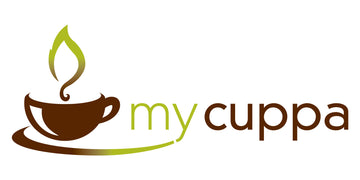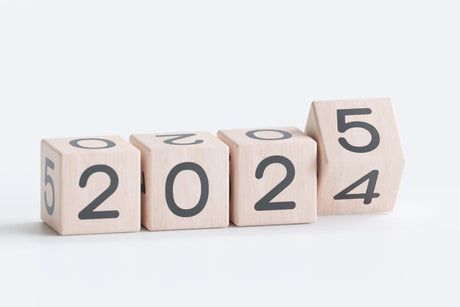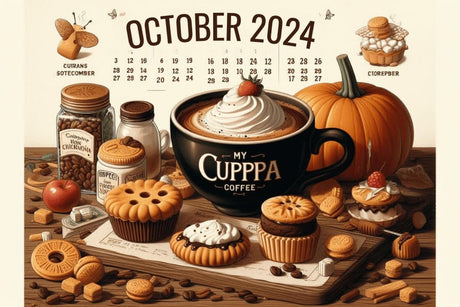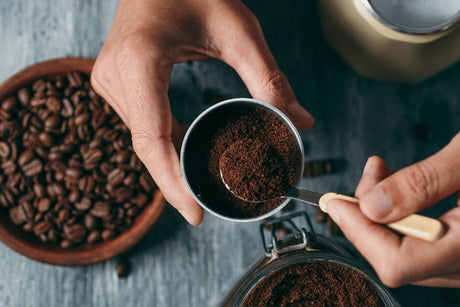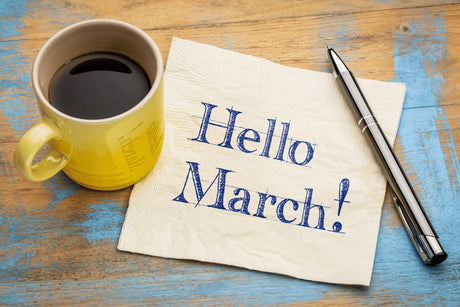“It's choice not chance that determines your destiny." - Jean Nidetch
mycuppa November 2021 Newsletter
October was a rather strange month - starting fast and furious in the same manner as the previous lockdowns. By the end of October, as restrictions eased in NSW and VIC, we see a glimmer of light at the end of a long 19-month tunnel of challenging work keeping up with the relentless demand for fresh, roasted quality coffee in the home.
By late October, consumers had changed gears and focused on relieving a pent-up desire for spending on items unavailable for so long - beauty treatments, haircuts, dining out, events, booking holidays, visiting friends and family. Lockdown hairstyles are gone.
With physical retail stores opening up, we hope the intense and excessive pressure that's overloaded and "brutally broken" Australia's parcel networks will ease.
The Xmas rush is now building with six weeks remaining and the significant annual sales events for BFCM (Black Friday, Cyber Monday) yet to run; it will undoubtedly result in another considerable freight network failure from extreme congestion in the last week of November and early December.
Please be mindful of another round of frustrating delays in the lead-up to Xmas - it's been the same every year since 2010, as the 1st week of December historically is particularly bad and the worst week of the year.
This time around, it's likely to be on another level, so please plan and allow more time for deliveries to arrive.
Speaking of Xmas, AusPost has put a stake in the ground, claiming that 13th December is the last day for lodging parcels for delivery to arrive before Xmas.
Although we doubt whether AusPost could predict or even guarantee their performances at any time, given such atrocious delays over the last three months, the performance in Victoria over the previous few months has been utterly shocking.
We are considering doing something sneaky and cheeky in November, so I'll let the cat out of the bag. For those of you considering whether to unsubscribe from the newsletter because there's nothing in it, be warned you will miss out as it will be a subscriber-only offer. In the current climate of rapidly rising coffee prices, this one will be a doozy and crazy.
In January, we predicted inflation would be a significant factor in this year's economy and accurate to form; inflationary metrics are now the most watched and debated topic globally as the pandemic disrupted supply chains and imposed higher costs on the price of goods and services.
Everything is more expensive today – it's no longer a figment of our imagination: cars, building materials, parts and components, barely any industry or product that has not undergone a price rise since the start of 2021. There's certainly been a big knock-on effect on pricing.
A few months ago, frost in Brazil and fears of continued drought caused raw coffee prices to increase by 40%. Despite some recent rains in the growing regions of Brazil, the global coffee index remains at a 7-year record high level with no signs of retreating.
There is no valid case for coffee prices to recover due to the 400% increase in shipping costs. Australian coffee retailers have already increased their prices and plan to do so again.
High differentials are being used to maintain prices due to a shortage of raw coffee.
At mycuppa, we continue to offer the most competitive value proposition in the Australian coffee market - freshness, speed, quality and price. We are selling at wholesale prices in a retail environment.
Here are some exciting stats: more than 2,850 brands are selling coffee in the Australian online marketplace, with most of them running their online business as a small side hustle yet pretending to be more prominent online than they are (which is no surprise).
At least 75% of brands selling into the Australian online segment only entered in the last 18 months (ironically due to the pandemic), and 25% of them in the previous eight months due to a lack of e-commerce resources to develop and launch new online stores.
Some of the outrageous claims by these "new online brands" on social media and advertising about being the biggest and the best are quite amusing.
We are safe in the knowledge that none can match our size, scale, speed and, critically, our 15-year legacy of invaluable experience as a trustworthy, dedicated online provider of fresh, roasted, premium quality coffee in Australia.
As one of the only fully dedicated online coffee merchants with an accurate enterprise-grade scale, it's the reason mycuppa can offer a lot more for less.
An update appears below on our sustainable packaging program.
The pandemic has put the brakes on everything relating to packaging innovation over the last 18+ months. It's still challenging to source conventional packaging within reasonable time frames, so the development of more environmentally friendly materials has taken a back seat while the disruption of the pandemic played out. We are still pushing to improve, but it's been hard work with innovation stalling.
Secret Label is a dangerous walk with a fully certified Organic blend on the dark side.
It is hard to believe we can offer Organic coffee when there are so many problems sourcing conventional coffees and the prices of coffee have gone through the roof, but we have come up with a fully certified Organic blend. Seriously, this is a great value offering at this price.
Peach, Blackcurrant, Caramel, dark chocolate with orange blossom sweetness.
I just remembered we have a new low-sugar powdered Chai product in our store.

November 2021 Secret Label
This month's Secret Label has been difficult.
Not just because there is a crazy shortage of coffee and we have just gone and sacrificed some of the best Organic lots we can source, but also because it's a walk into that dangerous dark side - blackcurrant and dark chocolate.
These are powerhouse flavour generators, but like anything that's a ten on a scale of 1 to 10, it also comes with the consequences of not appealing to everyone.
But then, Secret Label has always been about exploration - discovering the edges and dancing on the delicate footings of what is unique and distinctive without fear.
This is a different coffee, and I'm holding my breath until it proves itself in the field.
A fully certified Organic lot at this price in the current market is a bargain as it should be at least +$3/kg more expensive.
When we came across a pair of nice Organic lots, we thought, "A-HA", let's give this a spin.
Floral cup with peach and blackcurrants, dark chocolate and a silky juicy body.
A blend with deceptive levels of punchy flavour and our trademark long mycuppa coating finish.

Sustainable packaging update
For the last few years, we have been acutely aware of the urgency to transition the packaging of coffee products into a more sustainable solution.
Yes, we are tree-hugging Greenies at heart, as we always try to navigate our business towards reducing waste and recycling. Some of the current initiates such as clean energy generation, all by-products from roasting converted into heat pellets, our roasting equipment utilizing heat re-circulation technology and planned investments into electric vehicles, etc., all speak to the core of what we desire to achieve our sustainability goals.
Packaging of coffee beans and ground is a minor contributor to landfills. Still, we can't escape confrontations with climate change activists taking cheap potshots at us for destroying the planet when, in fact, we are trying our best to instigate change and shift into something better for the environment.
It's hard when you are a willing buyer, but there are no sellers - not unlike first-home buyers hunting for a house.
We are not a packaging company, and to give you some insight into a typical example of the attacks we must endure, a one-time-only purchaser lambasted our packaging last week because it was not 100% aluminium.
Ironically, when I tried to reason with this activist to explain such a product was not even available for coffee packaging anywhere, globally due to stringent food safety compliance, no supplier can produce this type of bag for commercial sale, the activist predictably refused to accept the explanation as if their eyes were closed and both hands were over their ears - a complete refusal to listen or understand which is not surprising.
It is vital to adequately inform people about industry-specific conditions or constraints they may need to know.
It's more complex than a fundamental bag for transporting goods; when it comes to coffee, there's a complex array of high-technology metalized layers bonded with food-grade materials to keep us safe and the roasted coffee fresh.
Coffee packaging is a precise science; everything down to the micron coatings requires careful specification and testing so the coffee bag will perform under rigorous conditions during production use, storage, transportation and end-user applications. The coffee packaging must be durable and reliable.
Coffee packaging is considered a complex task, which has led the packaging industry to prioritize other food productions that are easier to handle. As a result, coffee bag designs are often left until last.
Other ingredients that don't require such high-tech specifications for packaging can transition to eco alternatives with lower impact. If coffee had been so easy, it would have happened already, and this article wouldn't exist.
Applying undue pressure on small businesses that don't have the resources or capability to invent and implement new packaging solutions is just plain and simple bullying.
Small companies can't invest millions into research and development of advanced materials for packaging - even big companies can't do that in the modern economy, so we will all rely upon external packaging companies to keep inventing and improving their solutions to be at the frontier of technology.
Whilst it may not be obvious, it's more challenging behind the scenes as Australian coffee companies don't have abundant choices regarding bag packaging, with just a small number of local suppliers that are, in effect, import distributors of products manufactured overseas. Count them on one hand.
Coffee companies also tend to avoid making decisions based on packaging costs, as coffee bag manufacturing in Australia is offshore. Australia's continued demise of local manufacturing capability killed off local production; just like cars, it's all disappeared under the ongoing pressures of cost control, leading to a total shutdown of coffee bag manufacturing locally.
With all coffee bag packaging produced in cheaper offshore economies, it can be challenging to assess quality, value and environmental features simultaneously.
At mycuppa, we don't purchase our coffee bags from China (not that Chinese coffee bags are wrong), but our Australian-based supplier sources directly from Taiwan and Korea as the quality is far superior.
With coffee bag packaging, quality is everything. A few cents saved on an inferior bag is soon lost when the bag falls apart during production (filling and sealing) or the incredible beatings in transit.
Most Australian coffee companies purchase packaging made overseas, causing up to 20-week delays and quality issues. And risks when the bags arrive in a condition that does not match the original or agreed specification - we've seen it all - lousy chemical smell from improper curing, poor pre-made seals, valves not appropriately fitted, inconsistent sizing, bags falling apart when filling, etc.
Coffee companies choose packaging that provides an appropriate level of protection to preserve the quality of our products. The alternatives involve rapidly staling coffee, inferior quality and disappointed customers that will look elsewhere - a fast path to commercial ruin.
Last year, we significantly changed our crucial product line - 1kg bags, reducing plastic by 35%. We faced some challenges after implementing our new initiative, which included increasing the number of damaged and discarded bags during our morning production runs. Despite the difficulties, this was a necessary step in the right direction, even if it did not result in any immediate commercial benefits.
The pandemic has effectively put the emergency brakes on coffee packaging innovation over the last 19 months. It's been tough to source even our existing, standard packaging products, let alone discover and develop new solutions that meet improved environmental credentials.
Most packaging suppliers have been unable to keep up with demand as the global shipping crisis in the last 12 months means raw materials have been in short supply. All new innovative ideas have been put on hold until things return to normal.
As countries and economies emerge from lockdowns and restrictions, the ongoing shipping capacity challenge is still holding back innovation. We are also aware that some countries have selfishly stockpiled critical raw materials such as plant-based resins used in compostable and recyclable products, driving up the prices and limiting supply, which has shifted the priorities to focus on other food ingredient packaging instead of coffee.
In today's market, many Australian coffee companies claim to have eco-friendly packaging as a key selling point. However, they often must inform their customers about the proper usage and disposal requirements. For instance, many of these bags require processing in commercial facilities, not just any waste disposal bin. This lack of transparency is akin to politicians making promises without fulfilling them, resulting in catchy headlines but no real action.
The other key point with new eco-packaging is a failure of the coffee company to fully educate their customers on the limitations of their eco-packaging as it relates to preserving or protecting the quality of contents, e.g. a consumer may think they have a fresh pack of coffee unopened. Still, the high porosity of the eco-packaging means the fresh coffee has gone stale 4x to 10x times faster than traditional packaging through effusion.
Often, this detail is conveniently and deliberately ignored in case it risks detracting from the appeal of making a sale.
In our other segments, we are trying to implement improvements to our Nespresso capsule plant.
Currently, our unique co-polymer Nespresso capsules are designed for the ultimate in freshness protection with similar oxygen barrier protection capability as aluminium without the high resource footprint of mining and processing aluminium.
We understand customers desire choices for capsule packaging, and we are working on re-tooling our capsule plant for a more eco-friendly solution.
We successfully used compostable Nespresso capsules manufactured in Italy a few years ago. Still, the very nature of this product meant we also had to include an additional foil-based enclosure for the compostable capsules to protect and preserve freshness.
Disappointingly, many other sellers of these identical capsules offer the capsules in cardboard packaging with scant regard or respect for freshness. The fact that it has gone stale so quickly has yet to be mentioned.
Using additional foil shipping bags defeats the benefits of a compostable capsule. There have also been ongoing problems with the compostable lids (paper) instead of foil, which means we reverted to the original foil lids that require the consumer to separate the lid from the base at the disposal point. Lid materials are still an ongoing problem in the industry, yet many sellers ignore the issue by pushing sales ahead of product quality.
We are working on a new solution to deliver an end-to-end eco-friendly capsule solution. It's yet to be installed and tested, being a couple of months away, but we are excited at the possibilities this offers in what is by far the most waste-intensive segment of the coffee industry.
It's important to note that we continue to pressure our suppliers to "do better" in packaging solutions.
Unfortunately, coffee companies don't have the capital or resources to take control of the packaging innovation to develop breakthrough solutions. So, we will continue to monitor and validate all the latest materials to ensure that product integrity is maintained and our journey to net zero is realized.
